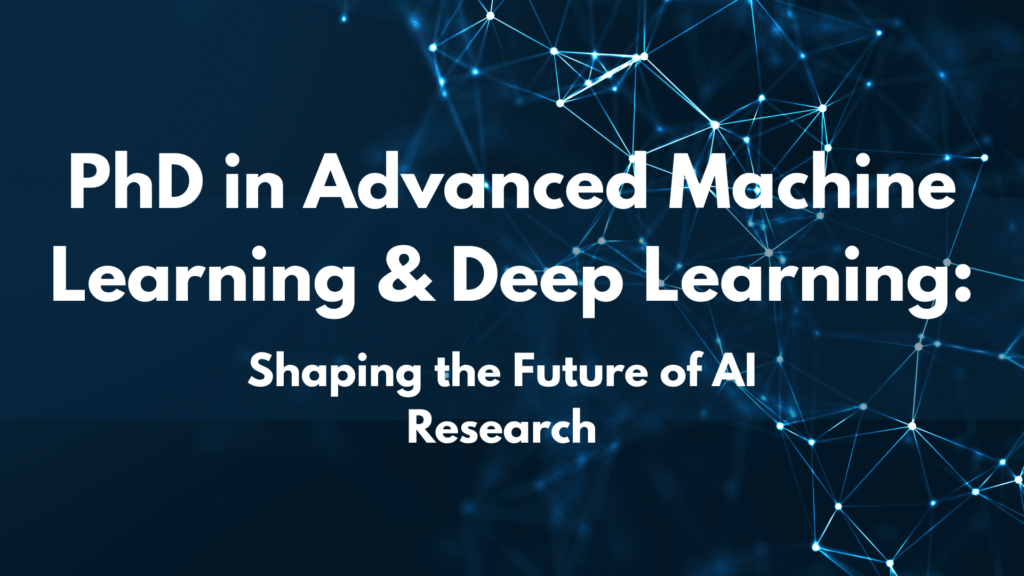We are witnesses to the AI revolution. Machine Learning (ML) and Deep Learning (DL) are no longer academic We are witnesses to the AI revolution. Machine Learning (ML) and Deep Learning (DL) are no longer academic curiosities; they are the engines powering everything from your smartphone’s voice assistant to breakthroughs in drug discovery and autonomous vehicles. But while many are learning to use these tools, a select few are tasked with inventing the next ones this is where a PhD in Advanced Machine Learning & Deep Learning becomes essential. This advanced program is designed for those who aim not just to apply existing algorithms but to push the boundaries of what is possible in artificial intelligence.

This is the realm of the PhD. Pursuing a Doctorate in Advanced Machine Learning & Deep Learning is a monumental commitment—a grueling yet exhilarating journey to the absolute frontier of artificial intelligence. It’s not for everyone, but for those with an insatiable curiosity and a drive to innovate, it is the most direct path to shaping the future.
If you’re standing at this crossroads, here are the five transformative reasons why a PhD could be your most powerful career decision.
1. Transition from Practitioner to Pioneer
There’s a fundamental difference between applying a pre-built model and creating the underlying architecture. A PhD forces this transition. You will move beyond tuning hyperparameters and using TensorFlow/PyTorch APIs to designing novel neural network architectures, developing new learning algorithms, and tackling problems like explainability and robustness at a theoretical level. You won’t just use the tools of AI; you will invent them.
2. Develop a Deep, Theoretical Foundation with a PhD in Advanced Machine Learning & Deep Learning
While a Master’s degree provides valuable breadth in machine learning, a PhD in Advanced Machine Learning & Deep Learning empowers you with profound theoretical depth. This transformative journey is centered on understanding not just the how, but the fundamental why behind the algorithms shaping our world.
As part of a PhD in Advanced Machine Learning & Deep Learning, you will immerse yourself in the mathematical foundations of AI, mastering the calculus of optimization and gradient descent, the linear algebra governing high-dimensional transformations, the statistics of generalization and overfitting, and the information theory intrinsic to learning itself.
This rigorous grounding unique to a PhD in Advanced Machine Learning & Deep Learning enables you to diagnose model failures, anticipate limitations, and create principled solutions, moving beyond reliance on empirical “hacks” to become a true architect of next-generation artificial intelligence.
3. Unlock Elite and Leadership Career Tracks
The career doors that a PhD opens are often inaccessible otherwise. This credential is your ticket to the most influential roles in AI:
- AI Research Scientist: Lead fundamental research at top AI labs like Google DeepMind, OpenAI, Meta AI, Microsoft Research, and NVIDIA.
- Academia: Become a professor, secure grants, mentor the next generation, and pursue a long-term research vision with academic freedom.
- Strategic R&D in Tech: Attain senior, visionary roles in tech giants (Apple, Tesla, Amazon) and cutting-edge startups, where you set the direction for AI development.
- Specialized Fields: Lead AI innovation in quantitative finance, biotechnology, and climate science.
4. Forge an Unbreakable Problem-Solving Toolkit
The essence of a PhD is solving a problem that no one on Earth knows the answer to. This process forges intellectual resilience—a “meta-skill” that is invaluable in any field. You will learn to:
- Navigate overwhelming ambiguity and undefined problems.
- Withstand repeated failure and critique.
- Deconstruct massive challenges into testable hypotheses.
- Communicate complex ideas with clarity and precision.
This mindset is what separates a PhD from other degrees and is highly prized far beyond the lab.
5. Earn the Authority to Steer the Future of AI
A PhD is the ultimate credential of expertise. It grants you instant credibility and a platform. Your opinions on AI safety, ethics, and direction will carry weight. You can influence policy, secure significant research funding, and lead teams to tackle humanity’s most complex challenges. In a field evolving as rapidly as AI, a PhD positions you not as a passenger, but as a pilot.
The Reality Check: Is It For You?
A PhD is a marathon, not a sprint. It requires:
- Intense Intellectual Curiosity: A drive to understand fundamentals, not just implement.
- Resilience: A high tolerance for failure, frustration, and ambiguity.
- Self-Motivation: The ability to work independently for years on a single problem.
- Passion for Research: A genuine love for the process of discovery, reading papers, and writing.
If you are driven by a need to understand the fundamental mechanics of intelligence and to leave a tangible mark on the technological landscape, the journey, for all its difficulty, is unparalleled.
The question isn’t just about what you want to do, but who you want to become: a consumer of AI or an architect of its future.
Frequently Asked Questions (FAQs)
Q1: Do I need a Master’s degree to apply for a PhD in ML?
A: Not necessarily. Many top programs in the US accept exceptional students directly from a Bachelor’s program, provided they have demonstrated strong research potential through publications, internships, or outstanding letters of recommendation. A Master’s can strengthen your application, but it is not always a strict requirement.
Q2: What’s the difference between a PhD in Computer Science with an ML focus and a dedicated PhD in Machine Learning?
A: This is a key distinction:
- PhD in Computer Science: Your degree will be in CS. You will likely need to fulfill broader CS department requirements, and your research will be ML-focused. This path offers great flexibility.
- Dedicated PhD in Machine Learning: These are often offered by interdisciplinary institutes or schools (e.g., CMU’s Machine Learning Department). The coursework and culture are intensely focused on ML, statistics, and optimization from day one. Your degree will be in “Machine Learning.”
Q3: How important is publishing papers during my PhD?
A: Extremely important. Publishing at top-tier conferences (NeurIPS, ICML, ICLR, CVPR) is the primary currency of PhD success. It is how you:
- Demonstrate progress and originality.
- Build your academic reputation.
- Receive feedback from the community.
- Fulfill the requirement to “contribute new knowledge” for your thesis.
Q4: What are the hottest research topics in advanced ML right now?
A: The field moves fast, but current frontier areas include:
- Foundation Models & LLMs: Efficiency, reasoning, multimodality, and safety.
- AI Alignment & Safety: Making models robust, truthful, and aligned with human values.
- Generative AI: Video, 3D, and music generation, and its application in science.
- Reinforcement Learning: Particularly its application to real-world, physical systems.
- AI for Science: Accelerating discovery in biology, physics, and materials science.
Q5: What is the single most important part of a PhD application?
A: A compelling Statement of Purpose (SoP) paired with strong Letters of Recommendation. Your SoP must clearly articulate your research interests, show familiarity with the work of specific professors at the university, and explain why you are a perfect fit for their lab. Letters from researchers who can vouch for your raw research potential and intellectual independence are invaluable.
- Explore accredited PhD in Advanced Machine Learning & Deep Learning
- Schedule a meeting with our experts.
